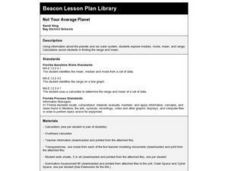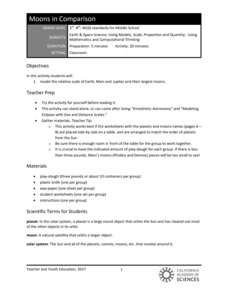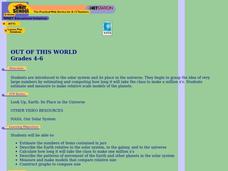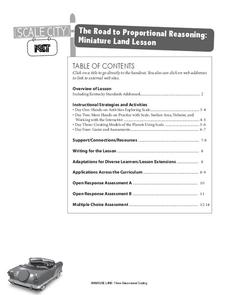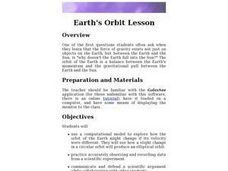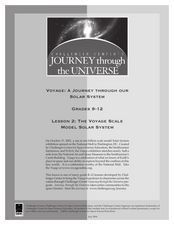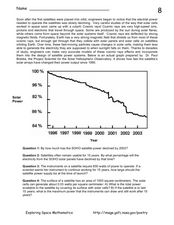Curated OER
A Model Solar System
If Earth is modeled by a grapefruit, what planet could be represented by a golf ball? This activity uses everyday and not-so-everyday objects to create a model of the Solar System.
Curated OER
Making Models of the Solar System
Students make several models of the solar system to learn the positions of the planets in the solar system as well as relative distances and sizes. Creation of these models will help them identify the planets by size, shape, color,...
Curated OER
Scale Model of the Solar System
Young scientists gain a better understanding of space, the solar system and its vastness by creating a scale model. Students first need to calculate the distance between each of the nine planets according to the size of their scale. This...
Voyage Solar System
Round and Round We Go — Exploring Orbits in the Solar System
Math and science come together in this cross-curricular astronomy lesson plan on planetary motion. Starting off with a hands-on activity that engages the class in exploring the geometry of circles and ellipses, this lesson...
California Mathematics Project
Model Solar System
The sun's diameter is 864,337 miles—challenge learners to create a scale model of the solar system that fits in your classroom. Scholars make conversions and work with scientific notation as they create the scale model.
Curated OER
The Mathematical Fingerprint of Our Solar System
Students study the beautiful mathematical model unique to our solar system.
Curated OER
Scale Activities
How do you put something as large as the universe in perspective? Use a series of scale experiments. Classmates collaborate around four experiments to examine the scale of the earth-moon system, our solar system, the Milky Way galaxy,...
Teach Engineering
Scale Model Project
Try your hand at scale models. Scholars create a scale model of an object using a scale factor of their choice. As part of the project, they give presentations on their processes and calculations. This is the last installment of the...
Curated OER
History of Our Solar System Time Line
Ninth graders explore the concept of ratios. In this ratio lesson, 9th graders construct a to scale time line that starts at the beginning of time. Students determine the correct placement of big events in time such as when the dinosaurs...
Curated OER
You Are Here
Students determine the relative size and distance of the planets in the solar system. They use ratios in their mathematical calculations to make models of the planets after discussing the relative sizes of the planets. They keep a...
Curated OER
Not Your Average Planet
Fourth graders explore median, mode, mean, and range using information about the planets and our solar system.
California Academy of Science
Moons in Comparison
Just how big is Earth's moon? With a hands-on simulation, scholars use Play-Doh to model the sizes of the planets Earth, Mars, Jupiter, and their moons. They make predictions as a class, work together to make their models, and discuss...
Curated OER
The Battle for Ultimate Power
Students gain an understanding of how the powers of 10 and scientific notation can be used to represent the scale of things in the universe. They relate the number of stars in the universe to the number of grains of sand on Earth's beaches.
101 Questions
Neptune
Examine an innovative approach to a large-scale model. Pupils across the state of Maine teamed up to create a model of the solar system that spans 40 miles. Put thinking skills to work within your classes as they make the calculations to...
Curated OER
On Jupiter
Students tour Jupiter. In this scenario based lesson, students examine the size of Jupiter and make models of the other planets in the solar system to show how large Jupiter is compared to the other planets.
Curated OER
Out of This World
Students are introduced to the solar system and its place in the universe. They begin to grasp the idea of very large numbers by estimating and computing how long it take the class to make a million x's.
Kentucky Educational Television
The Road to Proportional Reasoning
Just how big would it really be? Young mathematicians determine if different toys are proportional and if their scale is accurate. They solve problems relating scale along with volume and surface area using manipulatives. The...
CK-12 Foundation
Scientific Notation: Light Years to Centaurus Constellation
Connect scientific notation to a real-life situation. Measuring distances in our solar system require large numbers. As pupils make conversions using these large numbers, they begin to see the necessity of scientific notation. They...
Curated OER
Changing Faces: A Study of Solar and Planetary Rotation Rates
Students determine rotation rates of a variety of solar system objects using images and the Internet.
Curated OER
Planets an Introduction
Fourth graders investigate one planet, enter information into a database, and print the database sorting for each of the attributes.
Curated OER
Models of Planets
In this planet models worksheet, students use the radius of a given planet and its mass to answer questions using a model of a planet with a given radius. They determine the volume of the planet's inner core, the volume of its outer...
Curated OER
Earth's Orbit Lesson
Tenth graders devise a computational model to explore how the orbit of the Earth might change if its velocity were different. Using accurately recorded data, 10th graders defend a scientific argument.
Curated OER
The Voyage Scale
Students identify how models are powerful tools of exploration and that the sizes of the planets and distances between the planets in the Solar System span a large range. They make a sign for each planet they have created in the...
Curated OER
Cosmic Rays and Solar Cells
In this cosmic rays and solar cells worksheet, students read about how cosmic rays damage the electrical output of solar cells over time on satellites. Students use a graph of the solar power output compared to the year for the SOHO...












